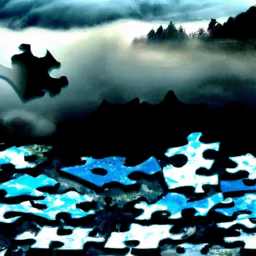As someone who has always been intrigued by the enigmas of the human mind, I frequently ponder why my dreams never seem to have any coherence.
I’ll find myself flying through the air one moment, only to be transported to a completely different location the next, without any rhyme or reason. It’s a frustrating experience, and one that I’m sure many of us can relate to.
So why exactly do our dreams seem so nonsensical at times?
Well, as it turns out, there are a number of different factors that can influence the content and meaning of our dreams. From the way our brains process and store memories to our emotional states and life experiences, there are a multitude of variables at play when we slip into the realm of the subconscious.
In this article, we’ll explore some of the key factors that can make our dreams seem confusing or nonsensical, and offer some tips for better understanding and interpreting the messages that our minds are trying to convey.
Key Takeaways
- Sleep disorders like sleep apnea or insomnia can cause vivid and bizarre dreams that don’t make sense.
- Dreams can be influenced by past experiences and memories, as well as current interests and hobbies.
- Personal associations and experiences play a role in interpreting dream symbols, which often hold hidden meanings that provide insight into subconscious thoughts and desires.
- Better dream recall can be achieved by keeping a dream journal, establishing a consistent sleep schedule, giving yourself enough time to wake up naturally, and reflecting on your dreams to remember more details.
The Purpose and Function of Dreams
Dreams serve a crucial role in our mental processing, helping to consolidate memories and emotions in a way that allows us to better understand and navigate our waking lives.
When we sleep, our brains are still active, processing the events and emotions of the day. Dreams are believed to be a byproduct of this activity, as our brains attempt to make sense of the information it has received.
However, not all dreams are created equal. Some are vivid and memorable, while others are forgettable or even nonsensical. This may be due to a number of factors, such as the stage of sleep we’re in, our current emotional state, or external stimuli such as noise or light.
Understanding the role of the brain in dreaming can shed further light on why our dreams may not always make sense.
The Role of the Brain in Dreaming
As the brain enters the REM sleep stage, it undergoes complex neural activity that gives rise to various sensory experiences. During this stage, the brain’s cortex is highly active, while its key communication pathways with the rest of the body are temporarily blocked off. This allows the brain to create a virtual reality-like experience that is disconnected from the external world.
One theory suggests that the brain’s activity during dreams is an attempt to process and consolidate memories and experiences. The brain replays recently acquired information, categorizes it, and integrates it with existing knowledge. This may explain why dreams often incorporate elements from our daily lives.
However, this theory doesn’t explain why dreams can be bizarre or nonsensical. The influence of emotions and experiences, which we’ll explore in the next section, may provide a more comprehensive explanation.
The Influence of Emotions and Experiences
The impact of emotions and experiences on dreaming can’t be underestimated, as they play a crucial role in shaping our dream content.
It’s no surprise that our dreams often reflect the events and emotions we experience in our waking life. For example, if we have a stressful day at work, we may dream about being chased or running away from danger. Similarly, if we experience a traumatic event, our dreams may be filled with fear and anxiety.
Moreover, our dreams can also be influenced by our past experiences and memories. Our subconscious mind may use our dreams as a way to process and make sense of these experiences. For instance, if we had a childhood fear of spiders, we may dream about spiders as a way of confronting and overcoming that fear.
Additionally, our dreams can also be influenced by our current interests and hobbies. If we are passionate about a particular activity, we may dream about it or incorporate it into our dream content.
As we can see, emotions, experiences, and memories can have a significant impact on our dream content. However, understanding the meaning and symbolism behind our dreams can be a challenging task. Nonetheless, by analyzing the symbols and themes present in our dreams, we can gain valuable insights into our subconscious mind.
Interpreting Dream Symbols
I find it fascinating how our dreams can be filled with symbols that often leave us wondering what they actually mean.
In this subtopic, we’ll be exploring common dream symbols and their meanings, as well as the importance of personal associations when interpreting them.
As someone who’s curious about the messages our subconscious mind sends us through our dreams, I’m excited to delve deeper into this topic.
Common dream symbols and their meanings
Dream symbols often hold hidden meanings that can provide insight into our subconscious thoughts and desires. For example, if you dream about water, it could represent emotions, while dreaming about teeth falling out may represent anxiety or fear of losing control. Similarly, dreaming about being naked in public can symbolize vulnerability or feeling exposed.
These symbols may seem random and confusing, but they can reveal important information about our inner selves. However, it’s important to note that dream symbols are not universal and their meanings can vary depending on personal associations and experiences. For instance, while some people may associate spiders with fear and danger, others may view them as symbols of creativity or feminine energy.
Therefore, it’s crucial to take into account our individual experiences and emotions when interpreting our dreams. Understanding the personal significance of dream symbols can help us uncover deeper insights into our subconscious and aid us in personal growth and self-discovery.
The importance of personal associations
Understanding personal associations with dream symbols can reveal deeper insights into our subconscious and aid in personal growth. While common dream symbols may have universal meanings, our personal experiences and cultural backgrounds also play a role in how we interpret them. For example, a snake may symbolize danger and temptation for some, but for others, it may represent wisdom and transformation.
To further illustrate the importance of personal associations, let’s take a look at a table that compares the traditional meanings of five common dream symbols with their potential personal associations:
| Dream Symbol | Traditional Meaning | Personal Associations |
|---|---|---|
| Flying | Freedom | Fear of failure |
| Water | Emotions | Relaxation and calm |
| Teeth | Strength | Insecurity |
| Death | Endings | Transformation |
| Money | Success | Materialism |
As we can see from the table, personal associations may not always align with the traditional meanings of dream symbols. By paying attention to our own feelings and experiences in relation to these symbols, we can gain a better understanding of our subconscious thoughts and emotions.
Moving on to the impact of sleep disorders, it’s important to note that they can also affect the clarity and coherence of our dreams.
The Impact of Sleep Disorders
You might not realize it, but sleep disorders like sleep apnea or insomnia can really mess with your dreams, leaving you feeling like you’ve just time-traveled from the Stone Age to the modern era. These disorders can cause interruptions in your sleep cycle, leading to a lack of deep sleep and an increase in REM sleep. This, in turn, can lead to vivid and bizarre dreams that don’t make sense.
Here are five ways sleep disorders can impact your dreams and your emotional state:
- Sleep apnea can cause sudden awakenings, leading to fragmented and confusing dreams that feel like a jumbled mess.
- Insomnia can lead to anxiety and stress, which can manifest in your dreams as nightmares or unsettling scenarios.
- Restless leg syndrome can cause physical discomfort that can carry over into your dream state, leading to uncomfortable or disturbing dreams.
- Narcolepsy can lead to sudden and unexpected bouts of sleep that can disrupt your sleep cycle and lead to unusual dreams.
- Sleepwalking and other parasomnias can cause you to act out your dreams, leading to potentially dangerous situations.
Now, let’s move on to the next section and learn about lucid dreaming.
Lucid Dreaming
If you’re ready to take control of your dreaming experience, try practicing lucid dreaming techniques. Lucid dreaming is the ability to become aware that you’re dreaming while you’re still in the dream.
With this awareness, you can then take control of your dream and manipulate the events that are happening. Lucid dreaming can be a fun and exciting way to explore your subconscious mind and even work through personal issues.
It can also be used to improve creativity, as you can actively participate in and direct the events of your dream. Speaking of creativity, did you know that there’s a connection between dreams and creativity?
The Connection Between Dreams and Creativity
Creativity and dreams collide, creating a captivating connection that can inspire and innovate. As someone who enjoys expressing myself through writing and art, I find that my dreams often provide a wealth of inspiration.
Here are three ways in which dreams can fuel creativity:
-
Dreams can introduce new ideas and perspectives. When we dream, our minds are free to explore ideas that we might not consider in our waking lives. This can lead to creative breakthroughs and new ways of thinking.
-
Dreams can provide vivid imagery. Many artists and writers use their dreams as a source of inspiration for their work. Dreams can offer up vivid and surreal images that can be translated into visual art or described in writing.
-
Dreams can inspire emotional connections. Dreams can tap into our deepest emotions and desires, providing a rich source of material for creative expression. By exploring the emotions that our dreams evoke, we can create work that connects with others on a profound level.
Dreams have a powerful impact on our creative lives, but they also have cultural significance beyond the realm of art and literature.
[Transition to the next section here.]The Cultural Significance of Dreams
As we explore the cultural significance of dreams, we uncover their role in shaping beliefs and traditions across the world. In many indigenous cultures, dreams are considered a form of communication with the spirit world. For example, the Aboriginal people of Australia believe that their ancestors communicate with them through dreams, and they use these messages to guide their daily lives. Similarly, the Native American Hopi tribe view dreams as a way to connect with their ancestors and receive guidance on how to live in harmony with the earth. Dreams also play a significant role in many religions, such as Hinduism and Buddhism, where they are seen as a pathway to enlightenment and spiritual growth.
To further illustrate the cultural significance of dreams, here is a table showcasing the different meanings dreams hold in various cultures:
| Culture | Dream Significance |
|---|---|
| Aboriginal (Australia) | Communication with ancestors |
| Hopi (Native American) | Connection to ancestors and guidance |
| Hinduism | Pathway to enlightenment |
| Buddhism | Path to spiritual growth |
| Ancient Greece | Messages from the gods |
| Egypt | Portal to the afterlife |
Understanding the cultural significance of dreams highlights their value beyond just entertainment or confusion. Dreams can provide insight into our spirituality, ancestry, and beliefs. By recognizing this, we can begin to appreciate the messages our dreams may be trying to convey. In the next section, I will share some tips on how to better recall our dreams.
Tips for Better Dream Recall
Ah, the elusive art of remembering our dreams – a task that can sometimes feel like trying to catch a slippery fish with our bare hands. However, with some effort and dedication, we can significantly improve our dream recall and start making sense of our nightly adventures.
One of the most effective tips for better dream recall is to keep a dream journal. As soon as you wake up, grab a pen and paper and write down everything you can remember from your dream. Don’t worry about making sense of it or organizing it – just jot down keywords or phrases that come to mind. This will not only help you remember your dream better, but it will also provide you with a record that you can review later to identify patterns or recurring themes.
Additionally, try to establish a consistent sleep schedule, as interrupted or irregular sleep can interfere with dream recall. Finally, make sure to give yourself enough time to wake up naturally and avoid jumping out of bed immediately after your alarm goes off. Taking a few minutes to lie in bed and reflect on your dreams can help you remember more details.
Frequently Asked Questions
How do I control my dreams?
To control my dreams, I practice lucid dreaming techniques such as reality checks, setting intentions before bed, and keeping a dream journal. With practice, I am able to become aware and manipulate my dreams.
Can dreams predict the future?
Dreams can be like crystal balls, showing glimpses of what’s to come. But they’re often cryptic and open to interpretation. Don’t rely on them for concrete predictions, but don’t dismiss them either.
Are nightmares a sign of a mental health issue?
Nightmares can be a symptom of various mental health issues such as anxiety disorders, PTSD, and depression. It’s important to seek professional help if they are impacting your daily life.
Why do some people never remember their dreams?
Sometimes I don’t remember my dreams because I don’t get enough sleep or wake up abruptly. Other times, it’s because I simply didn’t form a strong enough memory of the dream.
Is it normal to have recurring dreams?
Have you ever had the same dream over and over? It’s actually quite common. Recurring dreams are often a reflection of our subconscious mind trying to tell us something important.
Conclusion
So, why do my dreams never make sense? After researching and exploring the world of dreams, I’ve come to the conclusion that there’s no one answer.
Dreams serve a purpose and function in our lives, but they’re often influenced by our emotions, experiences, and even sleep disorders. Dreams can be interpreted through symbols, and some people even have the ability to control their dreams through lucid dreaming.
But perhaps the most fascinating aspect of dreams is their connection to creativity and cultural significance. Dreams have been used as inspiration for art, literature, and even scientific discoveries. They hold a special place in many cultures as a means of communication with the divine or ancestors.
So while my dreams may not always make sense to me, they hold a deeper meaning and purpose in the grand scheme of things. As the poet Robert Frost once said, "The best way out is always through."And in the case of dreams, the best way to understand them is to embrace their mystery and allow them to take us on a journey of self-discovery.









